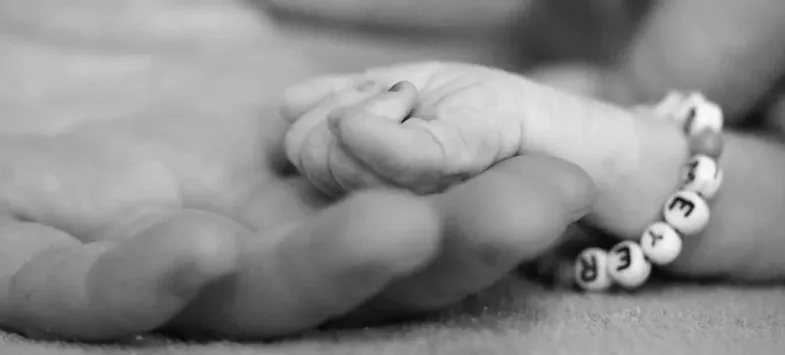
A story of pain and strength
Eugena Molla, an Albanian woman who chose to speak in an interview with Dalina Buzin, on "The Dalina Show", recounted her shocking story of her first pregnancy.
"I got pregnant in February 2019 and my due date was November 8, 2019," Eugena began to tell. The pregnancy was going well, despite the physical and emotional difficulties.
But just four days before her due date, Eugena began to feel something was wrong. The baby, who they named Luna, was no longer moving like before in her womb. A visit to the hospital confirmed the worst: the baby no longer had a heartbeat.
“That moment was the end of the world,” says Eugena. “The world collapses, a giant earthquake... then there's a kind of adrenaline that keeps you alive: 'Okay, this happened, what are we going to do now?'”

The birth was natural, for medical reasons, although Eugena experienced it as an experience beyond nature and logic. “You pushed a child that I know is not alive,” Dalina tells her, and Eugena describes the moment as a mixture of pain and relief: “Maybe, okay, it's over, I also finished this journey as a woman.”
But she had to face another difficult moment...
"Do you want to take a picture with the baby?" - The heartbreaking story
After Luna was born, her parents were able to hold her in their arms. “She was so beautiful,” Eugena recalls. “We held her until I left the hospital.” In those moments of grief and shock, they were offered the opportunity to have their baby photographed. There was a photography organization in Belgium that helped parents in such situations.
“I reacted very badly. I said, ‘I don’t want to, I don’t want to remember.’ It was the denial phase. I just wanted it all to be over, as soon as possible.”
But thanks to their insistence, Eugena agreed. And today, she wouldn't trade those photos for anything.
"We have Luna's hair, we have two children after her and three children in total. But the photos with Luna have helped me immensely to process the pain. If I hadn't taken them, I would have been worried for the rest of my life."
Photos with stillborn newborns - A tradition that is becoming normalized around the world
Photographing stillborn babies is a practice practiced in many countries around the world as a way to cope with the pain of loss. Specialized organizations offer free photographic services to families who lose a child before, during, or after birth. They create a tangible memory of a life that, although short, is eternal for the parents.

Why these photos matter
Photos of stillborn babies hold a deep meaning for many families, for several reasons:
Honoring a life, no matter how short it was
The babies did not really live outside their mothers' wombs, but they were real, loved and welcomed wholeheartedly by their parents. The photos are proof of their existence.
Tangible memories
Often, parents in such situations only have a few minutes or hours with their baby. A photo is a memory that never fades, a connection with the child.
Legitimizes pain
The pain of the birth of a stillborn baby is often a silent pain. Whereas, a photo says: “This baby existed.” It is a way of accepting and respecting the right to grieve.
Helps the healing process
Photos can be part of ceremonies, kept or shared with loved ones. They often become the foundation of a long journey toward processing loss.
Part of family history
Some parents decide to share these photos to raise awareness, break the silence, and help others experiencing the same loss.
Relationship with family and siblings
Photos are a way to show siblings who never had the opportunity to know their sibling, that they existed and were part of the family.
Eugena is one of many Albanian mothers who have gone through such pain, but rarely speak of it out loud. In her quiet but strong voice, she reminded us that even when it seems like the world is falling apart, love remains. And sometimes, that love lives on in a photo – a precious memory that gives parents the strength to move forward, always carrying a part of their child with them.
The full show about the loss on "The Dalina Show":





